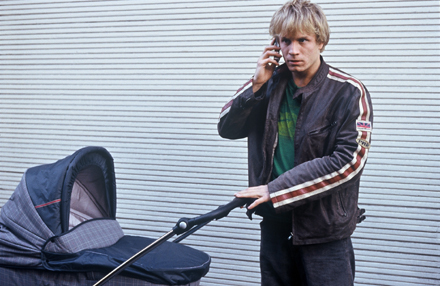|
Reviews of Recent Independent, Foreign, & Documentary Films in Theaters and DVD/Home Video
Directed & Written by: Jean-Pierre & Luc Dardenne. Produced by: Jean-Pierre & Luc Dardenne & Denis Freyd. Director of Photography: Alain Marcoen. Edited by: Marie-Hélène Dozo. Released by: Sony Pictures Classics. Language: French with English subtitles. Country of Origin: Belgium/France. 100 min. Rated: R. With: Jérémie Renier,Déborah François, Jérémie Segard & Fabrizio Rongione & Olivier Gourment. Cannes favorites Jean-Pierre and Luc Dardenne are on familiar terrain: the sparse black-and-white credit sequence; the hand-held uninterrupted tracking shots; and most importantly, the quiet and life-altering epiphanies. But unlike their last effort, The Son, the sequences are edited at a more clipped pace, which eventually build to one of the most suspenseful chase scenes in years, sans thundering music or rapid-fire intercutting. Their camera first follows a young woman, Sonia (Déborah François), barely 18, knocking on an apartment door while cradling a newborn in her arms. She’s informed by the occupants that her boyfriend has rented her apartment out while she was in the hospital. Locked out, Sonia, with her baby wrapped in her arms, hitches a ride on a motorbike to the street corner where Bruno panhandles. The pimply and lanky Bruno barely has time to see his son for the first time before he dashes across the street to sell a hot camera, but not before showing off his new duds – thanks to the rent money. When Sonia later asks Bruno for a middle name suggestion for baby Jimmy, Bruno’s focus is elsewhere. She practically has to douse him with beer to get his attention. Roaming from a homeless shelter to their dingy hideout by the river, their itinerant and threadbare lives are made possible by a cell phone, their lifeline for contacts. One call Bruno makes is to inquire how much money selling the baby to the black market would bring. Having debuted in the Dardenne brothers’ The Promise, Jérémie Renier, as Bruno, has since had a steady career. He’s joined here by Dardenne regular Olivier Gourmet and newcomer Deborah François in the seamless act-like-you’re-not-acting mode of drama. The seemingly random long takes of everyday slacking – Bruno stamping his footprint on a wall, his and Sonia’s playful roughhousing, the long bus rides – also bring a sense of verisimilitude. Far from being a rambling piece of cinéma vérité, a sense of danger permeates with a story line of the menacing black-market trafficking.
Unlike Gourmet’s cipher of a bereaved father in The Son, Renier’s impulsive Bruno is easy to read. It’s not that he is simply drawn, but rather the Dardennes take him on a belated coming of age step-by-step, leading to an unambiguously emotional finish. However, the minimalist tone may be an acquired taste – which might be why their films have been overlooked at the Oscars but awarded the Golden Palm twice, including one for this film.
Kent Turner
|

